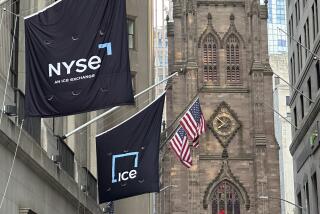As Vietnam Learns to Trade Stocks, We Get Remedial Ed
Vietnam’s first stock market opened for business on Friday, which undoubtedly sent founding communist leader Ho Chi Minh spinning in his sarcophagus.
But with capitalism triumphant worldwide, Vietnam’s current leadership knew it had to get with the equity-ownership program, Uncle Ho or no Uncle Ho.
On the first day of trading, 4,200 shares changed hands in two stocks--Refrigeration Electrical Engineering and Cable & Telecommunications Material Joint Stock Co.
There might have been more action, except that the government opted to cap both share prices for the day. Old communist control-freak tendencies tend to die hard.
Now, with the U.S. market’s trading patterns the standard for investors worldwide, there is a lot for Vietnamese investors to look forward to. For example, the first time that Refrigeration Electrical Engineering announces that it won’t meet analysts’ quarterly earnings estimates.
There was a lot of that kind of thing going around in the Nasdaq Stock Market last week--so much so, in fact, that by Friday many beleaguered tech-stock investors were probably wishing for Hanoi-style price controls on their stocks. (Well, controls on the downside, at least, if not on the upside.)
The Nasdaq market suffered a 4.7% plunge on Friday to 3,663.00, leaving it down 10.5% for the week--the third-worst weekly decline in the index’s 29-year history.
Even those tech stock investors who had steeled themselves for continuing volatility after the unprecedented swings of the first half of 2000 must be sweating last week’s slide. Anyone who owns tech shares can’t be terribly interested in revisiting their May lows, when the Nasdaq index bottomed after plummeting 37.3% from its March record high of 5,048.
*
Many market pros had been confidently proclaiming that Nasdaq’s bear market ended on May 23, with the index at 3,164. It certainly felt like it was over, as Nasdaq rocketed 35% from its May low to 4,274 by July 17.
Richard Eakle, a Fair Haven, N.J.-based hedge fund manager who has made some very smart market calls in recent years, told clients on July 17 that “at this rate of recovery, we may see Nasdaq hit 5,000 before it ever falls back to 4,000 again.”
He expects Nasdaq to be back to 5,000 within six months, and he may yet be right. But the ferocity of the latest declines in many technology stocks suggests a lack of conviction on the part of many people already in the stocks, as well as on the part of potential buyers waiting on the sidelines.
What is it that’s suddenly bothering investors? In part, the tech sector was rocked last week by announcements from some well-known companies, including long-distance giant WorldCom and wireless phone leader Nokia, that while second-quarter earnings were robust, growth in the near-term won’t quite meet analysts’ expectations.
But it’s amazing what passes for disappointment these days. Nokia on Thursday said delayed introductions of new cell phones will probably mean more consumers will put off purchases from the third quarter to the fourth quarter or to the first half of 2001.
The company, which sold $6.5 billion of phones and other equipment in the second quarter--up 55% from a year earlier--wouldn’t appear to be at risk of losing its premier position in the booming global wireless business if growth slows temporarily.
But sellers sent the stock down $14.75, or 26%, to $41.06 on Thursday--reducing the company’s market value from about $260 billion on Wednesday to under $200 billion by Thursday’s close.
On Friday, Nokia tried a favorite corporate strategy for dealing with a collapsing stock price: It announced plans to buy back up to 36 million of its shares. That helped lift the stock $2.75 to $43.81.
Though Nokia dropped a bomb last week, it has been part of a small minority of tech companies serving up warnings about the second half. If the Federal Reserve has in fact succeeded in slowing the economy with its interest-rate hikes, many companies haven’t noticed it in their results, or aren’t fessing up that they have.
Many tech companies continue to complain that their biggest problem is parts shortages that are keeping them from meeting demand.
The market, however, could simply smell that by September or October, Nokia and WorldCom will be more the rule than the exception.
Indeed, last week began with research firm Dataquest estimating that U.S. personal computer sales in the second quarter rose 11.5%. In the steel business, say, that might be considered heady growth. But it was the weakest PC growth figure in more than two years.
Wall Street, which is masterful at quickly extrapolating any trend for several thousand light years, may now sense that the technology business is hitting a cyclical hiccup.
If so, the high (or should we say, still-high) valuations of most tech stocks may be turning into an issue once again for many investors.
Nokia, at $43.81 on Friday, is priced at about 58 times the 76 cents per U.S. share it’s expected to earn this year, according to earnings-estimate tracker IBES International.
Is that too high a price-to-earnings ratio for a company that’s expected to produce earnings growth of 30% in 2001? Historical valuation parameters on Wall Street say it might be too high, especially if there’s any risk that growth might slow. But by recent tech stock standards, Nokia now looks relatively cheap.
How about computer networking titan Cisco Systems? At $62.81 a share on Friday, down $5.19 for the day, Cisco is priced at about 119 times the 53 cents a share it is expected to earn in the fiscal year that ends on Monday.
That’s cheaper than the 155 P/E the market gave the stock at its peak earlier this year. But is it a bit much for a company whose growth rate is about 32% a year now?
The idea that investors could collectively undergo a St. Paul-like conversion about stock valuations has been the dream of Wall Street’s biggest pessimists for the last five years. I think it’s early to suggest that’s what is happening.
But if we start talking about another Fed interest rate increase at the central bank’s Aug. 22 meeting--or some other shock to the economy that seriously threatens corporate earnings growth--valuations may well become Topic A of discussion among giant pension fund managers and neighborhood investment clubs alike.
*
Some investors haven’t been waiting for the rest of the market to question valuations: Quietly, real estate investment trusts have become one of the hottest stock groups this year. The Bloomberg index of 141 REIT stocks last week climbed to its highest level since May 1999. So far this year the average REIT stock has risen 18%--while Nasdaq is down 10%.
Why REITs? These trusts own portfolios of commercial or apartment properties. They pass rental income through to shareholders in the form of hefty dividends. Annualized dividend yields of between 5% and 10% are common on the stocks.
Wall Street cared little for REIT shares from mid-1997 through the first quarter of this year. Dividend income? Who needed it when tech stocks were soaring 10% a week?
Now, however, the idea of buying a stock for some kind of predictable income, as well as for the chance of a capital gain, is beginning to seem downright hip to more investors.
(BEGIN TEXT OF INFOBOX / INFOGRAPHIC)
Bad Memories: Nasdaq’s Worst Weeks
The Nasdaq composite index’s decline of 10.5% last week was the third-biggest weekly drop in the index’s 29-year-history. The 10 biggest weekly declines:
*
April 14, 2000: -25.3%
Oct. 23, 1987: -19.2
July 28, 2000: -10.5
Aug. 28, 1998: -8.8
Oct. 20, 1978: -8.7
Sept. 12, 1986: -8.4
Jan. 28, 2000: -8.2
March 31, 2000: -7.9
Oct. 12, 1979: -7.6
Oct. 9, 1998: -7.6
*
Source: Bloomberg News
(BEGIN TEXT OF INFOBOX / INFOGRAPHIC)
Running for Cover: REITs Resurge
Shares of real estate investment trusts, which tend to pay high dividend yields, have become market leaders this year after 2 1/2 years in Wall Street’s doghouse.
*
Monthly closes and latest for the Bloomberg index of 141 REIT stocks
Friday: 120.16
*
Source: Bloomberg News
*
Tom Petruno can be reached at [email protected]
More to Read
Inside the business of entertainment
The Wide Shot brings you news, analysis and insights on everything from streaming wars to production — and what it all means for the future.
You may occasionally receive promotional content from the Los Angeles Times.










